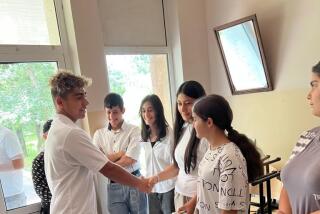Kids Get a Lesson in Cooperation
- Share via
ROCHESTER, N.Y. — Will teaching schoolchildren how to get along with others help them become more successful in school and in adult life?
Two psychologists at the University of Rochester believe it will. They have developed a program called “Study Buddies” that is being tried at some elementary schools in Rochester.
“Most adults have jobs that require them to get along with others,” says A. Dirk Hightower, one of the psychologists who developed the program model.
And, he points out, there are rewards for those who relate well: a waiter who gets along with customers gets bigger tips; a saleswoman who wins over customers sells more products; a manager who inspires loyalty will get better service from employees.
But in schools, Hightower notes, it is often perceived as cheating for children to help their classmates. So he and another psychologist, Rachel Robb Avery, designed Study Buddies to promote cooperation among school-age children.
Three schools within the Rochester City School District are using this pilot program.
The children involved are in fourth and fifth grades and are a representative sample of Rochester’s population.
Students work in pairs on classroom activities such as math or spelling. Children who have had trouble getting along with classmates because they are too shy or too aggressive seem to benefit particularly from this arrangement.
Twice a week for 45 minutes, the partners work together. Typically, the buddies develop their own company, name it, form the company bylaws and even choose company colors. Students then fill out reports which chart the progress of the company in reaching its goals--usually the number of math problems or spelling words that the pair got correct.
“The importance of this is to chart the progress of the company as a whole, and not the individual’s progress,” Hightower says. “This encourages students to really learn to work as a team.”
“Students learn that, by working with a partner, there is potential for a new friendship, but this friendship is not necessary for them to work together cooperatively, nor does the friendship always occur,” Hightower said.
In the two years that the program has been tried, the psychologists and teachers have noted several changes in the classrooms with paired students: Children are beginning to take over some teaching functions, instructing and helping their partner as needed. The teacher is then free to act as a consultant guiding the children at the onset of each new project.
“The results so far have all been positive,” Hightower said. “We’ve seen a decrease in the number of unexcused absences and in tardiness. We’ve also seen an increase in math aptitude scores in the Study Buddies classrooms, because the Study Buddies curriculum includes a unit in math.
More to Read
Sign up for Essential California
The most important California stories and recommendations in your inbox every morning.
You may occasionally receive promotional content from the Los Angeles Times.













